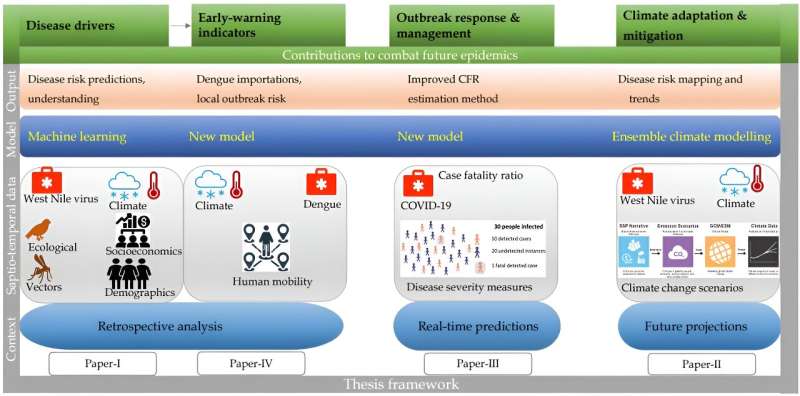This article has been reviewed according to Science X's editorial process and policies. Editors have highlighted the following attributes while ensuring the content's credibility:
fact-checked
trusted source
proofread
AI and math can help prepare for new infections in changing climate, new thesis shows

It is possible to forecast how different infectious diseases will spread across Europe in relation to global warming. Such a forecast is made by using artificial intelligence and mathematical modeling of changing travel patterns and disease effects, such as expected case fatalities in novel outbreaks. In this way, it will be possible to take countermeasures and build up preparedness. This is shown in a new doctoral thesis at Umeå University, Sweden.
"It will become increasingly important to predict how and where infectious diseases will spread. Several serious diseases are next in line to reach many countries in Europe as the climate changes and we also travel more. Through access to technology and data-driven forecasts, there is room to make decisions about capacity in health care and measures to curb the spread," says Zia Farooq, doctoral student at Umeå University.
In his thesis at the Department of Public Health and Clinical Medicine, Zia Farooq shows models that, by combining different types of data with artificial intelligence and mathematical modeling, can predict the spread of infectious diseases. One example is the disease West Nile fever. The spread of this viral disease via host animals is partly driven by climate change with rising temperatures, longer springs and drier winters. If countermeasures are not taken, the risk of West Nile fever in Europe could increase up to fivefold, reaching northwestern Europe, putting 244 million people at risk.
The thesis shows that the forecast model that Farooq and the research group he is part of would have been able to predict with good precision the latest and unusually large outbreak of West Nile fever in Europe in 2018. The methodology is based on applications of AI and machine learning algorithms that process disease occurrence data with climate and environmental, sociodemographic and trading data.
Another viral disease that is transmitted via mosquitoes is dengue fever. It can cause high fever, severe pain and life-threatening sequelae. Dengue fever was previously considered a tropical disease, but it is now spreading in Europe, mainly as a result of increased traveling and climate change.
In his thesis, Farooq shows that imports of dengue virus through infected travelers during the five-year period 2015–2019 increased by 588% compared to 20 years earlier. Effective imports require the presence of certain mosquito species in Europe that can carry dengue between human individuals, which is realized by increasing average temperatures in Europe.
The fact that dengue fever can spread in this way means that human travel patterns are important in general for also other similar diseases, such as Zika fever, yellow fever and chikungunya.
"Of course, it is important to reduce emissions and thus limit climate change. But we may not entirely be able to escape this problem as climate change is already happening. This is why it's important to have tools to be prepared to face the challenges of climate sensitive and emergent infectious diseases," says Zia Farooq.
More information: Navigating epidemics: by leveraging data science and data-driven modelling. umu.diva-portal.org/smash/record.jsf?pid=diva2%3A1855639&dswid=7558



















